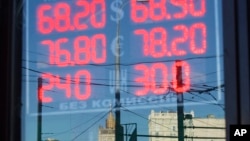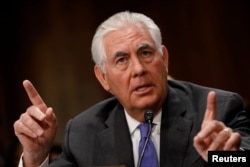The U.S. Senate on Wednesday overwhelmingly approved an amendment that would strengthen sanctions against Russia as a punishment for its campaign to influence the 2016 U.S. presidential election.
The provision also would require congressional review if the White House decides to relax, suspend or terminate sanctions already in place.
The bipartisan agreement came in the form of an amendment to legislation the Senate already is considering on sanctions for Iran. That legislation is expected to have strong support when it goes to the full Senate, and then would have to pass the House of Representatives and be signed by President Donald Trump.
It strengthens existing sanctions targeting Russian energy projects, while imposing new sanctions on those involved in serious human rights abuses, supplying weapons to the Syrian government, carrying out malicious cyber activities and doing business with Russian intelligence and defense.
Tillerson takes issue
U.S. Secretary of State Rex Tillerson criticized the new sanctions while testifying before the House Foreign Affairs Committee on Wednesday, questioning how effective unilateral sanctions would be in deterring Russia.
“They will be somewhat hollow and [President Vladimir] Putin will know they are hollow,” he said.
He called the sanctions “ill-timed” and said the administration needs the ability to “turn that heat up” on Russia, should a future situation call for it.
In December, following the election, the Obama administration imposed new sanctions against Russia and expelled a number of its diplomats as punishment for meddling in the presidential election.
The Trump administration has repeatedly downplayed Russian involvement in the election and denied the U.S. intelligence consensus that the Russian interference helped his campaign.
The U.S. intelligence community concluded in a January report that Putin ordered an influence campaign meant to hurt Democrat Hillary Clinton and help Trump's chances of winning.
The House and Senate, as well as a special counsel appointed by the Justice Department, are all investigating Russia's activities related to last year's U.S. elections, as well as potential links to Trump's campaign.






